We get a nice aerial view of the Telmarine castle at night. The music in this bit is subtle but very effective. A gryphon swoops down carrying Edmund and hides on the roof of a tower. The sentry there hears something but can’t see them. Suddenly, the gryphon’s claws snatch him away and Edmund drops down in his place. Cautiously, he looks over the edge of the tower, then sends a signal with his electric torch. I love the use of Edmund’s torch in this way. It’s one of the cleverest ideas in any Narnia adaptation that’s not from the books.[1]C. S. Lewis was a big fan of the medieval aesthetic and might have considered using a flashlight in medieval style battle to be “soiling it.” But I don’t watch movies because C. S. … Continue reading
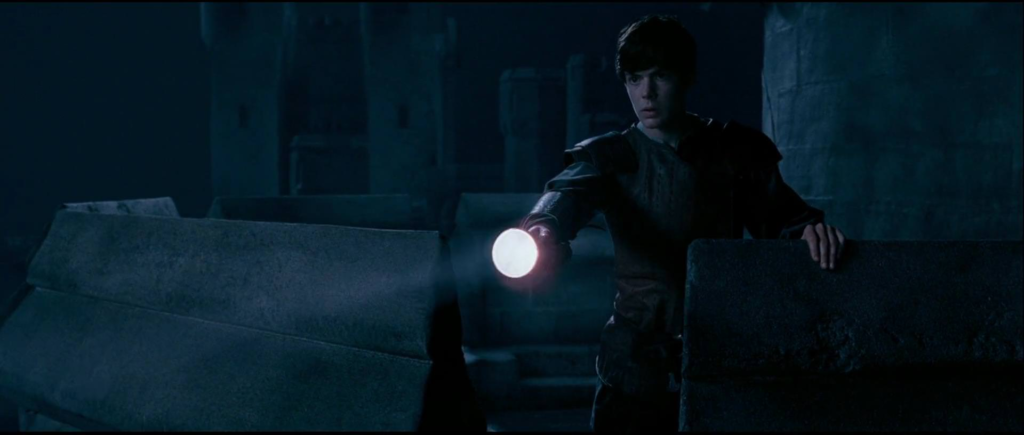
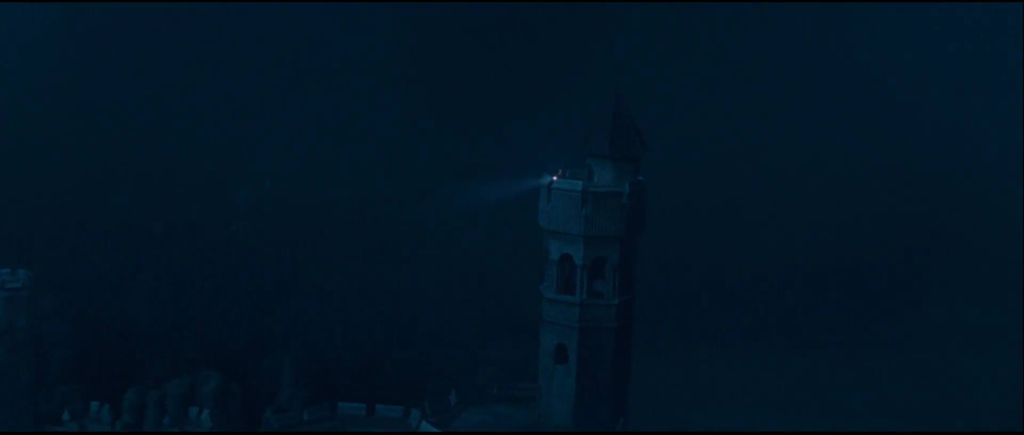
More gryphons fly down towards the castle. The subtle music becomes more pronounced and distinctly suspenseful. From faraway, the rest of the Narnian army sees the signals and emerges from the wood. Well, not quite all the rest of the army. Inside the courtyard, Reepicheep and two more mice pop up from what appears to be a sewer vent. We see the gryphons are carrying Peter, Susan and Caspian as they fly over the ramparts, the two kings and the queen kill more sentries.
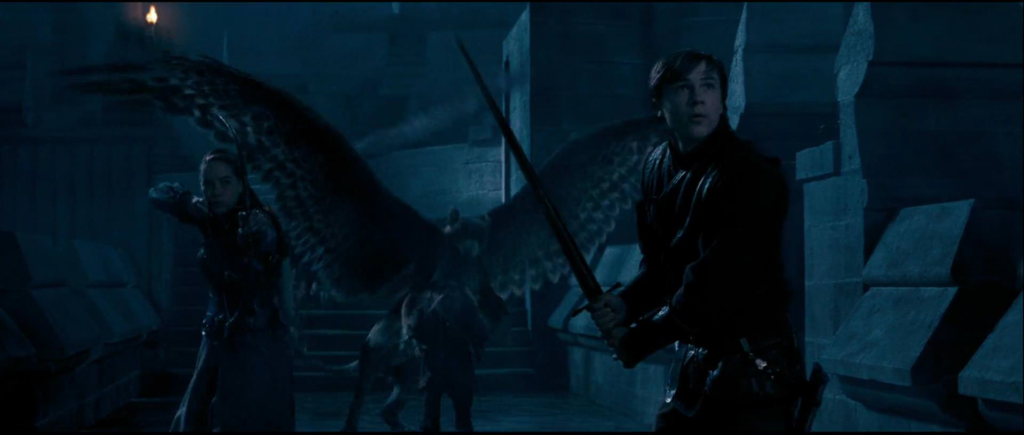
I suppose I have to note something here. I’m reluctant to do so since it requires getting into some inflammatory subjects, but I feel like it’s necessary to do a comprehensive analysis of this adaptation. Susan in this scene and throughout the film kills enemies just as efficiently as the other main characters whereas in the book, she hated killing even a nontalking bear. Now Susan isn’t my favorite character from the book, though I do like her, so I’m not too bothered by this, and I can admire her cinematic counterpart’s fighting skills in the book just as I do Edmund’s or Caspian’s. I am a bit cynical about the reasoning behind the change to the character though. From what I remember of the interviews with the director[2]Which I am too lazy to look up now., there was a fear that portraying Susan as being stereotypically feminine and refraining from warfare would send the message that girls can’t be warriors. This logic would lead to the movie’s Susan needing to be a master chef, a mechanical genius, a budding poet, and who knows what else lest impressionable viewers get the idea that girls can’t be those things either. Everyone assumes these days that if a generally male dominated story has one female character or for that matter, if a generally female dominated story has one male character, then they must be the representative of their entire sex. Doesn’t it occur to anyone that sometimes in real life, there will be a solitary woman in a group of men or vice versa and the stories are simply reflecting that?[3]Of course, in some cases, the token girl or token guy is supposed to represent their entire sex. If the storytellers want gender to be a theme, I interpret them that way, but that doesn’t seem … Continue reading
And what’s really annoying from a book fan’s perspective is that Susan is not the only heroine in the story! There’s also Lucy whose personality is much more that of an action heroine and whom in another Narnia book, The Horse and his Boy, goes to battle while Susan stays home though she only serves as an archer. She’s not called Queen Lucy the Valiant for nothing after all.[4]Critics who condemn the Narnia books as misogynistic tend to focus, maybe a little obsessively, on Susan. That’s reasonable enough since she’s very stereotypically feminine both in her … Continue reading But in this adaptation, Susan takes part in all the action scenes and her sister only takes part in one in which she ends up needing to be a rescued by one of the male characters. Way to add female empowerment to the story, enlightened ones. Still, I guess that makes sense with the situation. The movie has set it up that this attack on the castle is against Aslan’s will and Lucy is the only one really trying to follow his wishes. Also, Georgie Henley’s age and stature at the time of filming would have made it hard to believe in her as action heroine. Oh well.
A Telmarine soldier sees a minotaur and draws his sword, but Nikabrik knocks him out from behind. Meanwhile Reepicheep and his band scurry up the ropes of the drawbridge and into the gatehouse. I love the comical theme that plays for them on the soundtrack. I also love that the first obstacle they encounter there is a sleeping housecat.
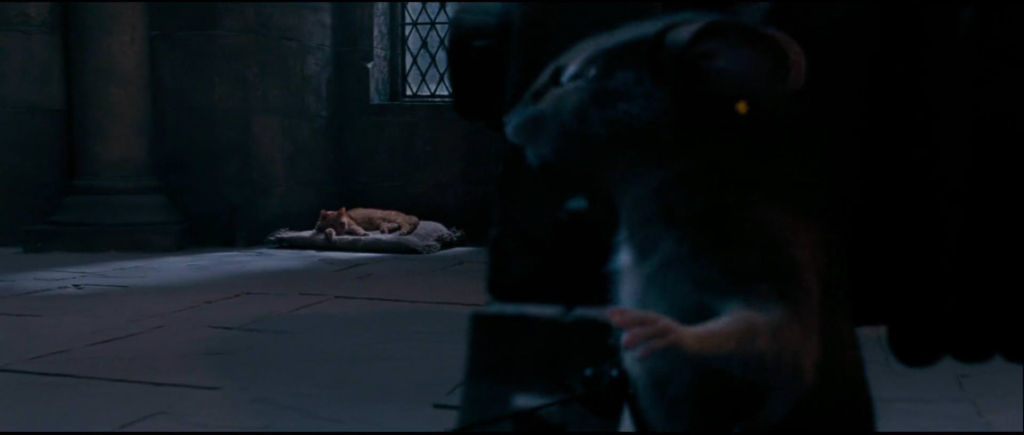
Caspian, Peter, Susan and Trumpkin climb down the walls of the castle via rope and Caspian breaks into the window of Dr. Cornelius’s study, wanting to get the man to safety before the raid commences. Caspian finds his spectacles lying on the table and his hourglass tipped over. Apparently, Cornelius would never leave the room that way unless he had no choice.
Caspian: We have to find him.
Peter: You don’t have time. You need to get the gate open.
Caspian: You wouldn’t even be here without him, and neither would I.
Susan (to Peter): You and I can deal with Miraz.
Caspian: And I can still get to the gate in time.
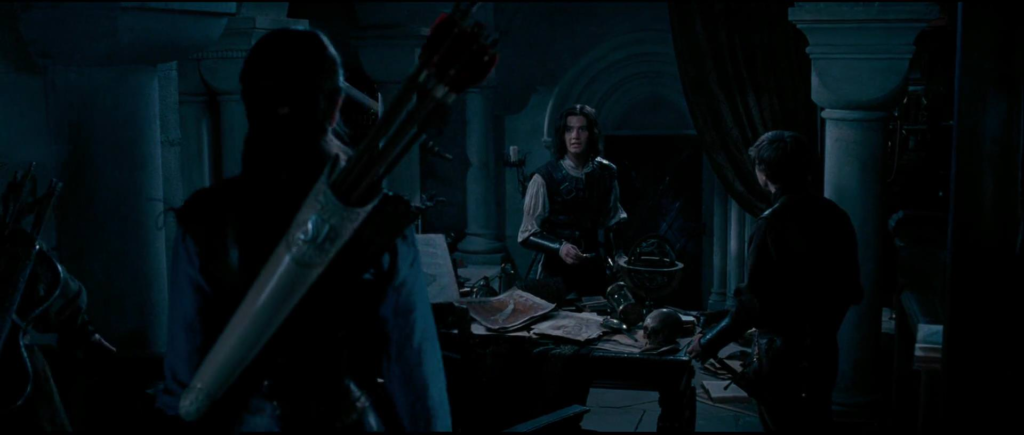
Caspian runs off to look for Cornelius to Peter’s disapproval. Trumpkin heads in a different direction. Back at the gatehouse, a Telmarine soldier enters to find, in a hilarious sight gag, the cat bound and gagged. While he’s still trying to process this, he hears a sword being drawn and turns around to see Reepicheep dangling in front of his face. “Yes, I’m a mouse,” says Reepicheep and (it’s implied) slits the man’s throat. Despite this Narnia movie focusing on violence more than the last one, we still don’t see any blood gushing from the throat. Some viewers may find that a distraction but, honestly, I don’t think I could enjoy this action scene with realistic wounds. And I really do enjoy this scene, far more than I enjoy the climactic battle or the melting waterfall scene from the previous film. I’ll give a reason why shortly. The mice run to the door, killing another soldier in their path, and climb on each other’s backs to open it. Trumpkin enters in lieu of Caspian just in time to shoot a third solider entering from the far end of the room.
Reepicheep: Ah, we were expecting someone…you know, taller.
Trumpkin: You’re one to talk.
Reepicheep: Was that supposed to be irony?
OK, I know I said I find this movie’s humor more consistently funny that the last one’s, but that bit is pretty weak.[5]To be fair, the worst line is the last one which Eddie Izzard, if I remember the audio commentary correctly, improvised. The movie didn’t have to keep it though. But this is a good example of what I love about the raid scene, the first part of it anyway. Not only does it incorporate Edmund’s torch, but it also makes the various creatures’ strengths and weaknesses an integral part of the action. The mice’s small size and agility enables them to infiltrate the gatehouse, but their relative lack of strength means they need help opening the gate and lowering the drawbridge. Caspian’s delay in assisting them adds to the suspense.
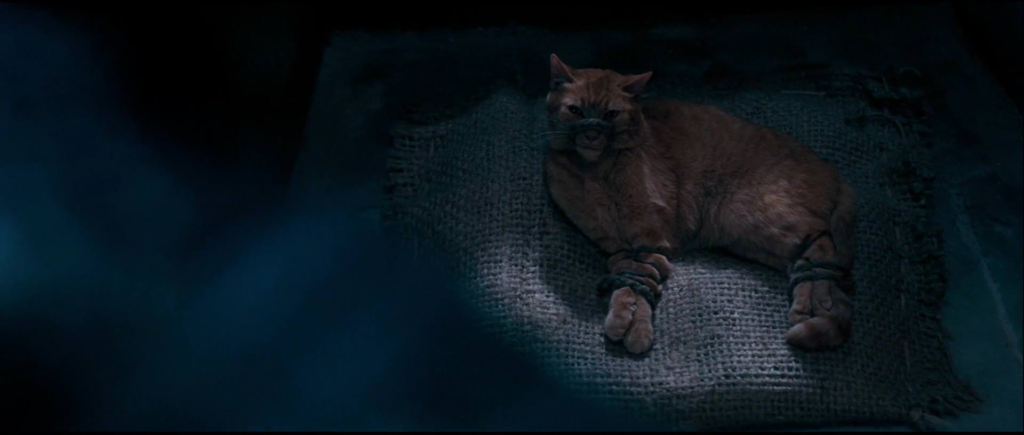
We cut to Cornelius lying asleep in the dungeon. Caspian awakens him just as the professor awoke him in the first scene of the movie. (Well, not exactly. He’s considerate enough not to put a hand over his mouth.) “Five more minutes?” Caspian says with a grin. “What are you doing here?” Cornelius demands as Caspian unchains him. “I didn’t help you escape just so you could break back in! You have to get out before Miraz learns you’re here.” Caspian hands him the key. “He will find soon enough,” he says, “We are giving him your cell.” Caspian turns to leave but Cornelius grabs him by the shoulder. “Don’t underestimate Miraz as your father did,” he warns. Caspian’s eyes widen and he seems to be having trouble breathing. “What are you talking about?” he says. Dr. Cornelius lowers his head. “I’m sorry,” he says. Caspian throws his hands off and runs out of the dungeon like he’s terrified. I don’t like where this scene is going but Ben Barnes does a good job of conveying his character’s horror at realizing Cornelius’s implication.
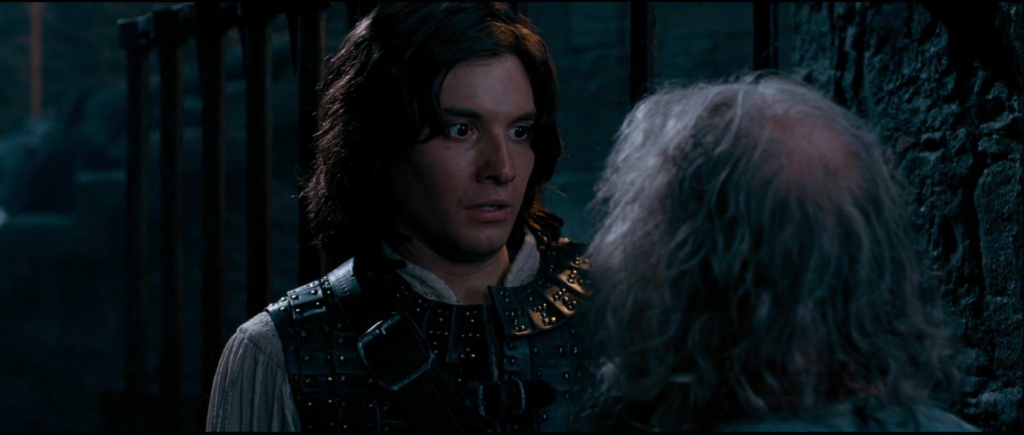
Peter and Susan sneak through the castle’s corridors. We cut to Miraz and Prunaprismia asleep in their bed. A sword pokes Miraz’s throat. He opens his eyes only to laugh condescendingly upon identifying the intruder. “Thank goodness,” he says, “You’re safe.” That’s right. It’s not Peter or Susan who is holding the sword. It’s Caspian. “Get up,” he snaps. Despite his casual, utterly unintimated attitude, Miraz must take Caspian seriously as a threat on some level because he obeys. His wife awakens.
Prunaprismia: Caspian?
Caspian: Stay where you are.
Prunaprismia: What are you doing?
Miraz: I should think it’s obvious, dear. You know, some families might consider this inappropriate behavior.
Caspian: That doesn’t seem to have stopped you!
Miraz: But you are not like me, are you?
Caspian doesn’t drop his sword or anything, but he draws back, a little uncertain of himself. “It’s sad,” says his uncle, “the first time you’ve shown any backbone and it’s such a waste.” Prunaprismia meanwhile grabs a crossbow from behind her bed, loads it and points it at her nephew. “Put the sword down, Caspian. I don’t want to do this,” she says. “We don’t want you to either!” says Susan as she enters the chamber, her own bow drawn, with Peter. This creates a Mexican standoff situation with Susan aiming an arrow at Prunaprismia who is aiming one at Caspian who is pointing a sword at Miraz who snarks “This used to be a private room.”
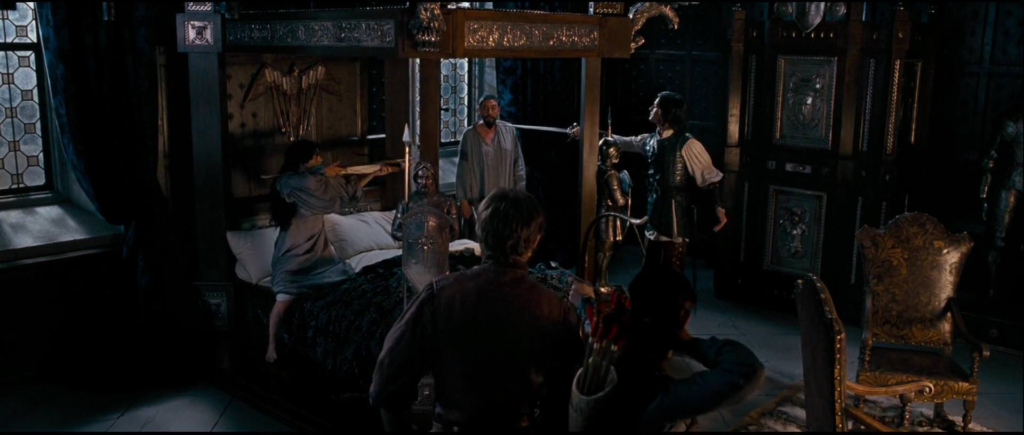
Again, I generally enjoy this movie’s banter, but I’m not sure if Miraz’s snarkiness really benefits the scene. It dilutes the suspense, making it obvious the scene is meant to be fun and nobody we like is really going to die.[6]From what I understand, humor in recent Marvel movies has been criticized for much the same reason. The idea, I guess, is to make Miraz intimidating by having him be really fearless but I don’t think it works that well. Maybe the movie agrees with me on some level because in the following exchange, Caspian manages to back his uncle against the wall through sheer intensity though the man’s expression doesn’t betray any fear.
Peter (to Caspian): What are you doing?! You’re supposed to be at the gatehouse!
Caspian: No! (to Miraz) Tonight for once I want the truth! Did you kill my father?
Miraz: Now we get to it.
Prunaprismia: You said that your brother died in his sleep.
Miraz: That was more or less true.
Susan: Caspian, this won’t make things any better.
Miraz: We Telmarines would have nothing had we not taken it. Your father knew that as well as anyone.
Prunaprismia: How could you?
Miraz: For the same reason, you will pull that trigger. For our son!
Prunaprismia (to Caspian): Stop!
Susan (to Prunaprismia): Stay right there!
Miraz: You need to make a choice, dear. Do you want our child to be king? Or do you want him to be like Caspian here? Fatherless?!
I remember the first time I watched the movie. I’d been enjoying it so much up to this point and I distinctly remember being annoying at this scene for taking me out of it. What are my problems? First of all, I can’t empathize with Caspian demanding to know if Miraz murdered his father because…well, of course, he did! It’s traditional in stories like this. And it isn’t as if Caspian had believed his uncle was a wonderful human being before now. He wasn’t surprised at all that the man was out to kill him. I can still buy that he would be stunned by the idea that Miraz killed his father. (The book describes Caspian as “feeling very queer” when Cornelius reveals the information to him though not a big deal is made of it afterwards.) But why jeopardize the whole siege by immediately running to Miraz and demanding an answer instead of doing his job at the gatehouse? He knew the plan was to capture Miraz anyway. Why not wait and interrogate him later? I guess I buy that Caspian was so shocked by the idea of his father being a murder victim that he panicked and lost all confidence that the Narnians would succeed in taking Miraz and the castle. But, again, should the idea have really been that much of a shock? While Peter is generally the less likeable of the two characters in the movie, I can’t blame him for being exasperated with Caspian here.
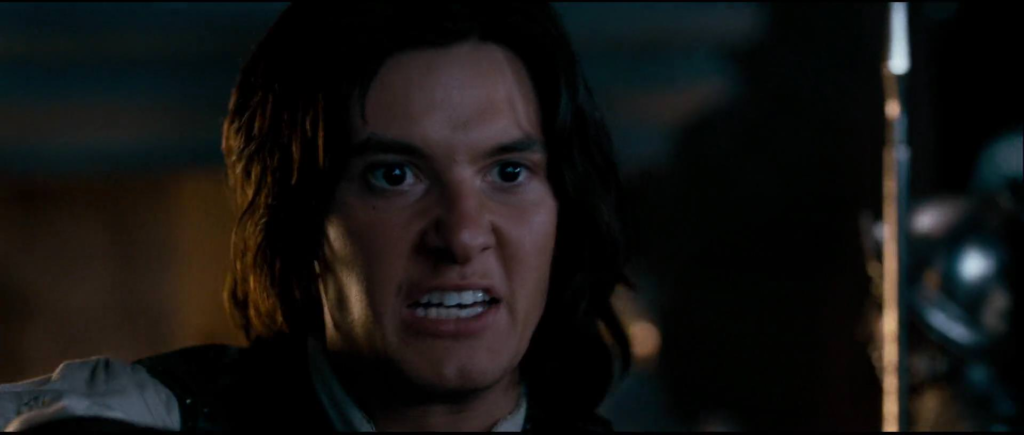
Then there’s what they’re doing with Prunaprismia. In the book, we don’t know anything about her except that she has red hair and dislikes Caspian. The former thing was once was seen as very unattractive, though happily for redheads this is no longer so, and while the latter doesn’t necessarily make her an evil person, realistically speaking, the book doesn’t want us to think that realistically. I’m not a fan of adaptations taking (implied) villains and making them more sympathetic but, to be fair, doing so for Prunaprismia will allow this movie to keep a memorable moment from the book’s last chapter that would probably have otherwise been cut for being too random. However, this feels like such a strange time to suddenly delve into her character! She’s only appeared in two scenes prior to this one and had no dialogue unless you count screaming while giving birth. I had no problem with this on a first view, assuming that, as in the source material, she wasn’t going to be important. And now in a scene that really should be focused on Caspian, she’s given this highly dramatic situation. It’s so awkward and jarring. It doesn’t help that while Alicia Borrachero’s performance is generally great, her line readings in this scene make her character seem less shocked by these revelations about her beloved husband than she should be. If I remember the audio commentary correctly, the idea was that she had suspected that he wasn’t the greatest guy for a while but there’s not much about the dialogue to suggest this.
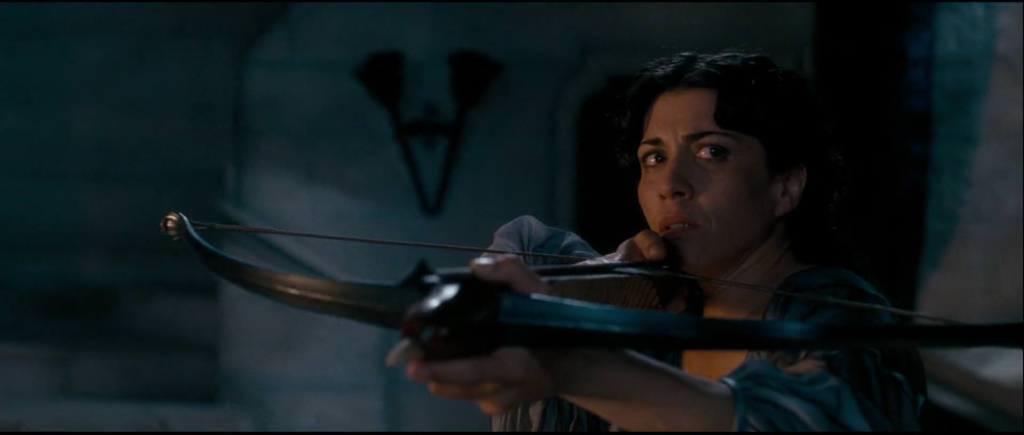
Anyway, the prospect of her son growing up without a father makes Prunaprismia pull the trigger, wounding her nephew in the shoulder. Miraz takes advantage of this distraction to get away, evading Peter. His wife throws herself on the bed, weeping. (Again, Borrachero is generally great in this movie, the casting of which is generally superb.) We cut to Edmund on the tower, fumbling with his torch and dropping it on the parapet below. When I first saw the movie, I thought this was because he was startled by Prunaprismia’s scream. On reflection, I think that’s just a coincidence since if she were really that loud, every soldier in the area would have reacted to her. Part of me likes the idea though as it would make Caspian’s dumb decision even more integral to the scene. A Telmarine finds the torch. Hilariously, while trying to figure out what it is, he shines it in his own face and waves it around, confusing Nikabrik, Glenstorm and the other Narnians outside who wonder what crazy signals these are supposed to be. Edmund jumps onto the man’s back.
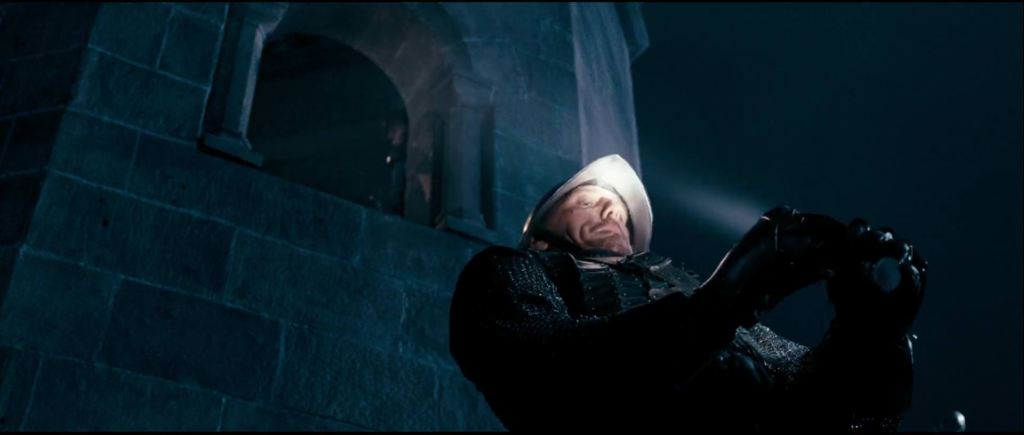
Throughout this, the clamor of bells is heard. Miraz has sounded the alarm. We see Telmarine soldiers jumping out of bed and grabbing their armor and weapons. Instead of beating a hasty retreat, Peter, followed by Susan and Caspian, runs down to open the gates and let in his forces. “Now, Ed, now! Signal the troops!” he calls as he races across the courtyard. “I’m a bit busy, Pete,” calls Edmund who’s fighting the Telmarine who found his torch.[7]Fun facts: Peter is never called Pete in the books and Susan is never called Su in the movies. Edmund and Lucy are called Ed and Lu in both. Well, I think those facts are fun. It turns out Peter also has to battle some opponents before he reaches the gates. Thankfully, both brothers win those fights and Edmund retrieves the torch, but he has some trouble getting it to work. Peter meanwhile desperately turns the crank for raising the castle gate’s portcullis despite Susan’s protests that it’s too late and they must call off the attack while they have the option. “No, I can still do this!” insists Peter. “Help me!” Seeing that they don’t have time to change his mind and more Telmarine troops are coming, Caspian and Susan obey. Meanwhile, Trumpkin and the mice work the machinery to lower the drawbridge as well as they can unassisted. “Exactly who are you doing this for, Peter?” Susan demands. He doesn’t reply, either because he’s using all his strength and energy on the gate or because he doesn’t have a good answer.
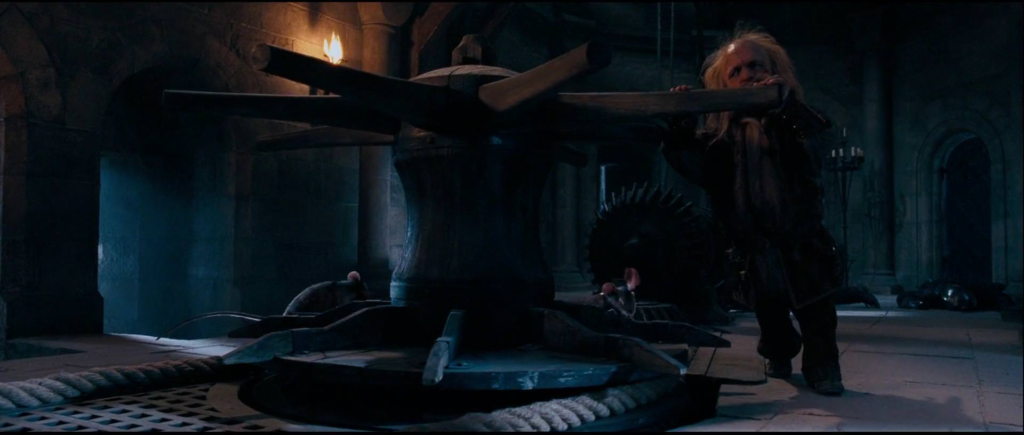
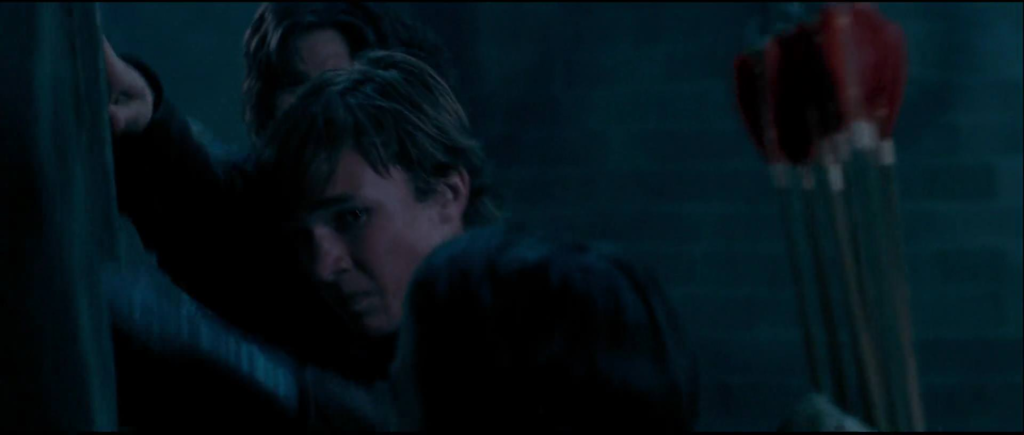
Finally, Edmund gets his torch to work. He signals the Narnian troops who charge through the town, across the bridge and into the courtyard. Not a moment too soon for their leaders since that courtyard is filling with Telmarine enemies. As he, Susan and Caspian enter the fray, Peter yells, “For Narnia!” Now in the last movie, his battle cry was “For Narnia and for Aslan!” I’d like to think the omission of that last part here is to reflect his attitude toward the Lion but in the next Narnia film, the Narnians battle cry will still just be “For Narnia,” so that’s probably reading too much into it.
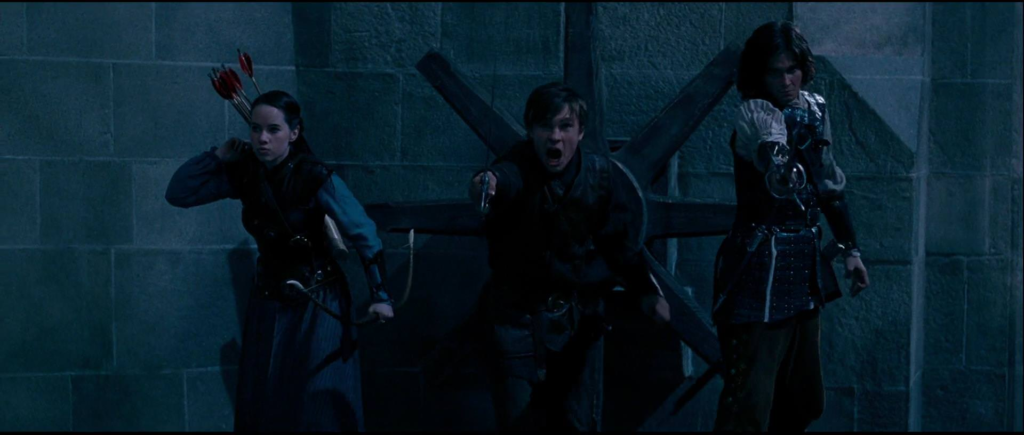
I don’t have much to say about the ensuing battle. I don’t find it as fun as the first part of this scene but, to be fair, it’s not supposed to be fun. It’s supposed to be intense and depressing. There is a really silly moment when Susan kills an opponent, not by shooting him or stabbing him, but throwing an arrow at him. And there’s a cool moment for Edmund when he has to slide away from a bunch of enemy archers and kicks a door shut behind him. It’s full of the arrows the next moment. He runs down a hall and out onto another parapet, using his torch to bar the door behind him. I’d like to take this moment to say that though is one of the only major characters in the movie not to have an arc of some sort, he’s a fun, likeable presence.

Back to the scene. Miraz sends troops to the gatehouse. Trumpkin puts up a good fight but gets pushed out a window. It’s not a short fall and the landing looks like it hurts. A minotaur sees the portcullis being lowered and runs under it, holding it up with great effort. Peter finally decides the situation is hopeless and orders his army to retreat. Now the Narnia books describe a good king as being the first in every charge and the last in every retreat, so you could say that this goes against their philosophy. Honestly though, I can’t really blame the movie for disagreeing with that philosophy. Realistically speaking, you’ve got to retreat sometimes, and a king being killed or captured because he was the last to go means a terrible inconvenience for his side since he then has to be replaced. Anyway, to help get Susan to safety with all possible speed, Glenstorm pulls her onto his back. In the Narnia books, riding a centaur is a great honor that hardly anyone receives. I can buy that Glenstorm would casually bestow that honor on Susan since this is a desperate situation but as a book fan, I wish the movie would treat it as a big deal and not a matter of course.
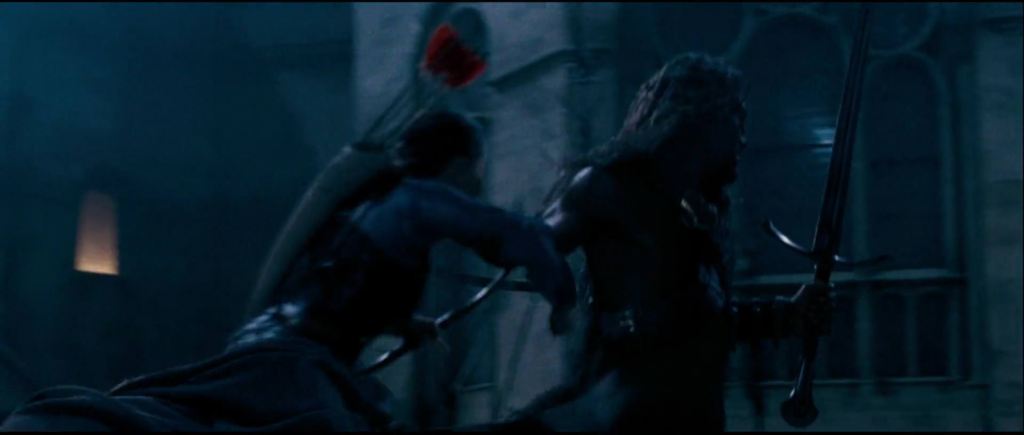
As Glenstorm gallops off, Susan calls for Caspian who has disappeared. “I’ll find him,” says Peter. Needless to say, there’s a lot going on right now, so forgive me if this description is choppy. Various Narnians are escaping through the gates, but the minotaur is having a hard time keeping the portcullis up. Edmund’s pursuers break down the door he barred behind him, but he evades them by dropping off the parapet onto a gryphon’s back. Caspian emerges from the castle on his horse-ah, yes, I neglected to mention Glozelle brought back Caspian’s lost horse when he captured Trumpkin-along with Dr. Cornelius on another one and a third horse for Peter. Miraz sees this from his balcony view. “Give the order,” he tells Glozelle. “My men are still down there,” Glozelle protests but Miraz grabs his crossbow from him and shoots the minotaur, yelling, “Now!” Apparently, that order was for the Telmarine archers to rain arrows down into the courtyard indiscriminately. The minotaur manages to hold up under the onslaught long enough for more of his allies, including Peter, Susan and Caspian, to escape. For a moment, he even manages to defiantly raise the portcullis higher than he had it before. But eventually it’s too much and he collapses. I’m afraid this didn’t have the intended sad effect on me since I never liked the idea of heroic Narnian minotaurs and was happy to see one less.
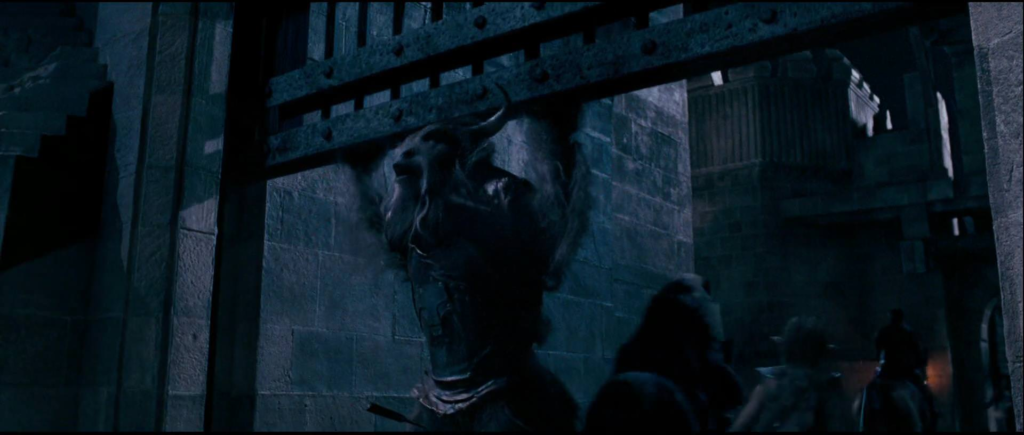
Amusingly, the gap his body makes under the portcullis is still big enough to let Reepicheep and the other mice escape. But, alas, far more Narnians are now trapped like rats.
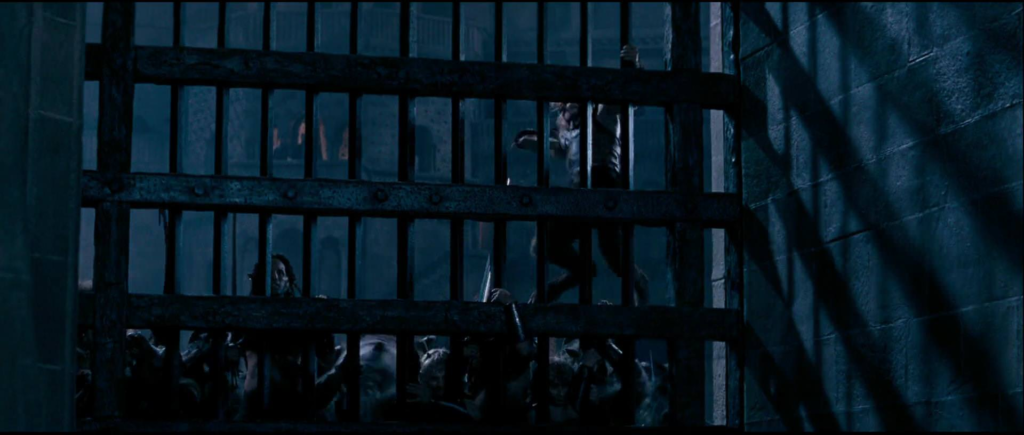
Peter, Susan and Glenstorm pause in their flight to look back at them. We see a faun try to climb up the gate, only to be shot down. For all the problems I have with William Moseley’s performance as Peter in this movie, he shines here with some really heartbreaking facial expressions.
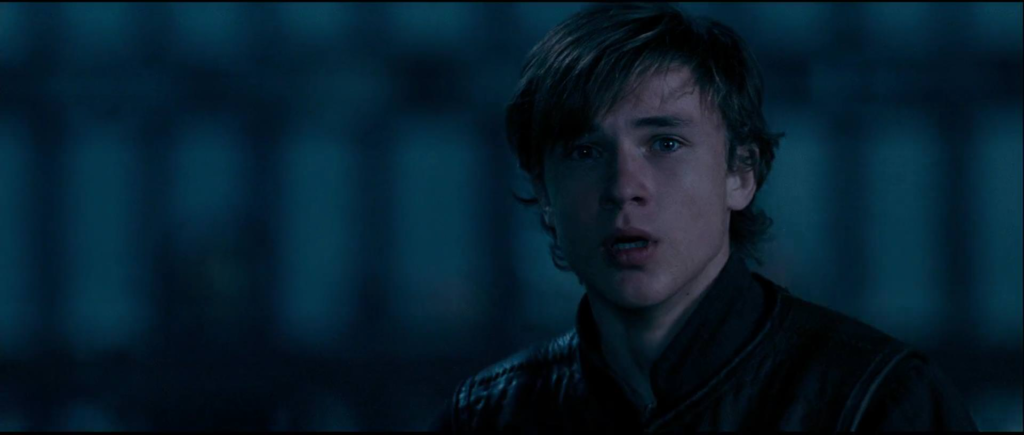
He’s not the only one. There’s a nice moment where one of Glenstorm’s sons gives a stoic nod to his father from behind the gate and turns to face the enemy. Caspian calls to Peter that the drawbridge is being raised and now is his last chance to escape. Peter doesn’t like leaving his troops behind, but he forces himself to do so. The scene ends with Edmund and the gryphon flying over the courtyard, staring down in horror. While we don’t get a close look, the place is clearly filled with dead and dying Narnians.
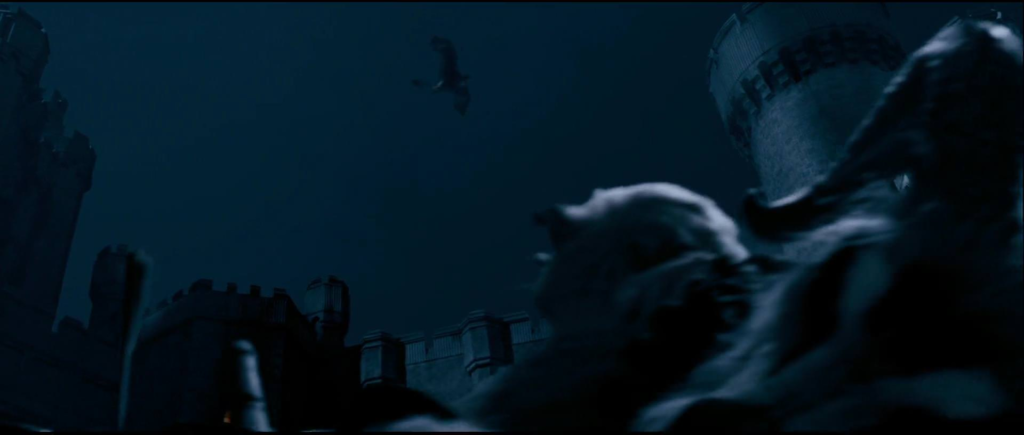
I’m somewhat bewildered whenever fans bring this scene up as an example of the Narnia movies adding pointless action scenes. Unlike the melting waterfall from The Lion, the Witch and the Wardrobe (2005), it’s integral to the plot and can’t really be removed from it.[8]Though in the melting waterfall’s defense, that scene did serve to build up to Peter slaying Maugrim. I’d also argue it’s not so much an added scene as something from the book that’s been changed a good deal. Remember in the source material, Caspian didn’t blow the horn and summon the Pevensies until he and the Narnians had been fighting for a while.
It was after they had taken up their quarters in and around the How that fortune began to turn against them. King Miraz’s scouts soon found their new lair, and he and his army arrived on the edge of the woods. And as so often happens, the enemy turned out stronger than they had reckoned. Caspian’s heart sank as he saw company after company arriving. And though Miraz’s men may have been afraid of going into the wood, they were even more afraid of Miraz, and with him in command they carried battle deeply into it and sometimes almost to the How itself. Caspian and other captains of course made many sorties into the open country. Thus, there was fighting on most days and sometimes by night as well; but Caspian’s party had on the whole the worst of it.
At last there came a night when everything had gone as badly as possible, and the rain which had been falling heavily all day had ceased at nightfall only to give place to raw cold. That morning Caspian had arranged what was his biggest battle yet, and all had hung their hopes on it. He, with most of the Dwarfs, was to have fallen on the King’s right wing at daybreak, and then, when they were heavily engaged, Giant Wimbleweather, with the Centaurs and some of the fiercest beasts, was to have broken out from another place and endeavoured to cut the King’s right off from the rest of the army. But it had all failed. No one had warned Caspian (because no one in these later days of Narnia remembered) that Giants are not at all clever. Poor Wimbleweather, though as brave as a lion, was a true Giant in that respect. He had broken out at the wrong time and from the wrong place, and both his party and Caspian’s had suffered badly and done the enemy little harm. The best of the Bears had been hurt, a Centaur terribly wounded, and there were few in Caspian’s party who had not lost blood. It was gloomy company that huddled under the dripping trees to eat their scanty supper.
This leads to Caspian finally blowing the horn and the attack on the castle in the movie leads to Peter finally sending Lucy to look for Aslan. (As I mentioned before, the script really should have given him a better reason to specifically do that, but I digress.) If the adaptation had literally followed the book, there would have been several costly battles rather than just one. Technically, this is cutting action scenes. Is the problem changing the location? Personally, I think that’s an improvement. Having the battle take place at the castle is much more visually interesting that in “the open country.”[9]Maybe the issue is that in the book, at the very first war council, the overzealous mice “proposed storming Miraz in his own castle that very night.” Thus, an idea that was presented as … Continue reading Is the problem that the scene is too depressing? The equivalent in the book is more humorous with an emphasis on Wimbleweather’s bumbling.[10]It’s even more comical in the book where it’s followed by a scene of him weeping over his mistake and drenching the mice, much to their annoyance. I can understand that criticism, I guess. It is sort of untrue to the book’s spirit. But in a movie, unless it’s a farce which is untrue of either version of Prince Caspian, I’m not sure how you could play an army suffering so without being tacky. Honestly, C. S. Lewis only gets away with it in literary form by skimming over the battle scene itself. The only way to be perfectly true to the book’s spirit at this point would be to show a series of unsuccessful battles in a montage and, I’m sorry, I like the scene in the movie better than that idea. Is the problem just that this scene makes Peter too unlikeable? I guess I can’t argue with that. I’ve written before in this series, why his character assassination doesn’t rankle me as much as some fans and I’ll probably write more about the topic later. For now, I’ll just close by saying that, on the whole, I personally enjoy this scene in the movie a lot.
Next Week: Sorcery and Sudden Vengeance AKA The Film’s Weirdest Scene
References
| ↑1 | C. S. Lewis was a big fan of the medieval aesthetic and might have considered using a flashlight in medieval style battle to be “soiling it.” But I don’t watch movies because C. S. Lewis would have liked them. I watch them because I like them. |
|---|---|
| ↑2 | Which I am too lazy to look up now. |
| ↑3 | Of course, in some cases, the token girl or token guy is supposed to represent their entire sex. If the storytellers want gender to be a theme, I interpret them that way, but that doesn’t seem to be the goal of either the literary or the cinematic Prince Caspian. |
| ↑4 | Critics who condemn the Narnia books as misogynistic tend to focus, maybe a little obsessively, on Susan. That’s reasonable enough since she’s very stereotypically feminine both in her good traits (motherly, doesn’t like to see anyone get hurt) and her bad ones (not a lot of stamina, overly concerned with makeup and appearances in the last book.) However, it ignores the fact that there are four other leading ladies in the series and the others don’t fit as neatly into gender stereotypes. Why should one of five be considered the normative one? |
| ↑5 | To be fair, the worst line is the last one which Eddie Izzard, if I remember the audio commentary correctly, improvised. The movie didn’t have to keep it though. |
| ↑6 | From what I understand, humor in recent Marvel movies has been criticized for much the same reason. |
| ↑7 | Fun facts: Peter is never called Pete in the books and Susan is never called Su in the movies. Edmund and Lucy are called Ed and Lu in both. Well, I think those facts are fun. |
| ↑8 | Though in the melting waterfall’s defense, that scene did serve to build up to Peter slaying Maugrim. |
| ↑9 | Maybe the issue is that in the book, at the very first war council, the overzealous mice “proposed storming Miraz in his own castle that very night.” Thus, an idea that was presented as ridiculous in the book is taken seriously in the movie. But remember the context. When the mice made this proposal in the book, they had no reason to think the castle’s defenses would be down. |
| ↑10 | It’s even more comical in the book where it’s followed by a scene of him weeping over his mistake and drenching the mice, much to their annoyance. |
